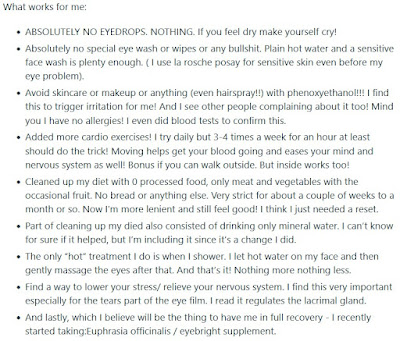I used to have oily hair and oily skin. I was excessively oily, and it was annoying. I'd love to be that way again. I'd rather have too much moisture than not enough.
My hair is now extremely dry, just like the rest of me. Sjögren's disease attacks all of the moisture-producing glands in the body, and it has caused my hair and skin to go dry.
I take a megadose of fish oil each day. It mitigates the dryness to some degree, but I'm still very dry.
Before I started taking thyroid medication in 2014, my hair was thin and brittle. I saw improvement with thyroid medication, and gradually more improvement over the years as I added supplements.
I saw even more improvement in my hair beginning in late 2022 when I was switched to Tirosint, which is hypoallergenic. Still, my hair had lots of breakage, even though it was much better than it once was.
Back when I had oily hair, I always washed it every day. That habit was so ingrained that I have continued to wash my hair every day all these years, even once it became dry. I just don't feel clean unless I wash my hair.
For a number of years, I've tried to figure out ways to get my hair to be less dry. All the common online advice says not to wash hair every day. When I've tried that, my hair becomes even more dry.
I created this blog because most of the common advice found online doesn't help me at all, and the hair situation is a perfect example. I finally figured out that my hair is less dry when I wash it every day, just like I've always done.
Do you know why? The moisture-producing glands in my scalp produce almost no moisture at all. I think it's a combination of my aqueous deficiency and damage to the sebaceous glands.
The act of washing my hair puts moisture in it. It's so obvious now. Washing my hair gets it completely wet. I let it air dry so that more moisture stays in it. My hair is nice and soft in the evening after I've washed it.
Around the time I figured this out, I saw an article that was in line with my thoughts.
Washing Your Hair Once a Week May Not Be a Good Idea—Even If It Looks Clean
While some experts say that washing your hair once a week is fine as long as you use a good shampoo and your hair responds well to that frequency, there's another side to the argument. If your hair is extremely dry and not washed often enough, it can lose its natural moisture with age.
That has been my observation. I need to wash my hair every day.
When I skip washing my hair, my hair becomes more dry as the days pass. As my hair dries, it becomes more brittle and more prone to breaking.
The top six inches or so of my hair is shinier than the rest of my hair. It has a different consistency, and there's much less breakage. I believe that sea buckthorn oil is the reason why my recent hair growth is of higher quality.
Sea buckthorn has also improved the health of my gums. My gums used to be swollen, which caused my teeth to be so tight that I couldn't floss. I can now floss easily.
The most popular brand of sea buckthorn oil is SeabuckWonders, but I prefer Sibu. The Sibu sea buckthorn oil smells better and has a nicer color than other brands.
I started using Nexxus Repair and Nourish Ultra Lightweight Hair Oil back in February. The directions say that it can be applied to wet or dry hair. Whenever I apply it to dry hair, my hair ends up looking greasy and stringy. It does not absorb properly when applied to dry hair.
I apply it to my hair right after I wash it when my hair is still wet. By applying it when my hair is wet, the oil distributes evenly through the hair so that my hair isn't oily.
I find that I can also apply the oil when my hair is in the early stages of drying where it is still quite damp. If I apply it when my hair is over halfway dry, then my hair becomes oily and stringy. So long as my hair is quite damp or wet, the oil works great.
There was a bit of a learning curve when first using the Nexxus oil, since I didn't know how much to apply. The directions say to apply 2-3 drops. The container has a pump, so they might mean 2-3 pumps instead.
My hair is long, down to halfway down my upper back. I put around 5-6 pumps in my palm, rub my hands together, and then apply on the lower half of my hair, being sure to get the ends. I then repeat the process on the top part of my hair.
My hair will always be below average, but at least I've seen improvement over the years.







